Next leg defines The Ocean Race 2023
Published on February 22nd, 2023
The first two legs of The Ocean Race were a combined 6500 nm, which is not quite half the distance of what the five IMOCAs will face when they start February 26 for the 12750 nm third leg from Cape Town to Itajai in Brazil.
Along with the distance being twice as much, so is the scoring system which doubles the points. The first set of points (equivalent to a leg) will be awarded according to the order of passage at longitude 143° East (south of Australia) and the second (equivalent to a second leg) according to the order of arrival in Itajai.
But it’s not just the distance that sets the leg apart, but also how the unstable ride of the IMOCAs amid the extreme winds and waves of the southern oceans will provide five weeks of hell for the crew.
It was enough for the 46-year-old British sailor Abby Ehler, who is on her fourth Ocean Race as part of the crew of Holcim-PRB, admits it was a tough decision to agree to sail on Leg 3, after stepping aside for Leg 2.
You had decided there was no way you were going to sail on Leg 3, so what changed your mind?
I was pretty adamant I was not going to do the leg, and that was set in stone a little bit during the delivery back from Guadeloupe on this boat. It was so uncomfortable – it was just horrendous – and I was like there is no way I could survive 35 days doing this.
Then I did Leg 1 and really enjoyed the crew. It was a very different experience. Kevin (Escoffier) is just positivity off the scale. And I think you just absorb his energy. It’s hard not to feel like you’re in good, safe company and in the knowledge that he can sail the boat on his own, and we’re effectively there it help him and make it go faster.
I thought about it and chatted about it a lot with my husband. The comment he made was this leg is the race; if you haven’t done this leg, you can’t really say that you’ve done it. So I think, deep down, there was a little feeling that wanted to do it, but I had my way-too-sensible head on.
But thinking it through and analyzing it, I am confident that I can physically get through this. Chatting to Kevin, when we stopped in Cape Verde, and just having time to digest Leg 1, and thinking about it, I really do want to do this leg; I’d be angry with myself if I didn’t.
How you are going to deal with the psychological challenge? Will you be counting off the days in your head?
I find it can be quite depressing counting the days, and there is a great quote by Mohammad Ali – ‘don’t count the days, make the days count’ – and I think that will be my motto to live by.
Cape Horn is obviously the key point from where you are going north, and you are going into warmer weather, and that will be almost like turning the corner to the final leg home. That’s the benchmark – get to Cape Horn, and mentally that’s a huge goal.
I’ve been involved in the food packing, and making sure that we’ve got plenty of comfort food and variety, as well as the stuff that’s going to keep us going, because having a meal and snacks is such a milestone of each day. And yeah, I think I am just going to live by that.
And what will the Holcim-PRB team strategy be for this leg?
I know from our small chats already, that we have to kind of write-off the two wins in the first two legs and start “clean” because, as Kevin has said, if we get to the end of the race nobody will remember these two wins. It’s what happens going forward, so we have always got to be looking forward, and not back.
What do you think is tougher – VO65 or IMOCA in the southern oceans?
I’m going to say IMOCA, marginally.
The difference is, on the 65, it’s very physically demanding – from the perspective that you are exposed to the elements. You’re on deck, you are getting wet, you are getting hosed, you are getting cold. And you savoir that moment when you get down the hatch and you can dry off and get into your sleeping bag.
On the IMOCA, when you are on-watch, it is very mentally involving and mentally stimulating, having to monitor data. You are almost having to dial into that sixth sense, because you don’t have the feel of the wind on your face and you are not getting hosed and you can’t see the waves. So you are having to rely, and concentrate on, your feel of the boat and looking at the numbers.
But there is also just the physical factor – the boat is so uncomfortable, the motion is a lot impacts. It can be very hard to sleep and switch off, because of the noises and the alarms, and just the amount of stimulation mentally that’s going on around you. I find it very hard to switch off. So I have to say, yes, the IMOCA would win the difficulty comparison…
Why do you have kept coming back to this race, having first sailed it 22 years ago?
There is just something about it that I love, and I think it’s that you are always striving to do better than the last one, and each of those races that I’ve done. The first one (Amer Sports Too 2001-02), there was a lot of ‘I am doing it for the first time’ feeling, and the novelty factor was there, and soaking up all of the experience. At the end, I just had this burning desire to do it again and to do it better.
Then there was a massive gap before Team SCA (2014-15) came along, and that was a great experience because it was a professionally-funded campaign and we were well looked after. But we really lacked experience as a team.
So to have the opportunity to sail with Team Brunel (2017-18) – and to sail with the likes of Bouwe (Bekking), Capey (Andrew Cape), Pete Burling, and Kyle Langford – was just amazing. I was suddenly in the company of champions, and able to soak up their knowledge, and we almost pulled off a win as the underdog team.
Now, this edition presents itself as a completely different style of sailing, and the challenge is almost re-learning the sport.
What would it mean to you to win the race, Abby?
It would be the ultimate dream and goal because, like I said, there is something about it that keeps drawing me back, and we came so close to it with Brunel (which finished third) and almost had a little taste of victory. So culminating with a win would probably tick the box, so I wouldn’t have to come back and do it again.
Race details – Route – Tracker – Teams – Content from the boats – YouTube
IMOCA: Boat, Design, Skipper, Launch date
• Guyot Environnement – Team Europe (VPLP Verdier); Benjamin Dutreux (FRA)/Robert Stanjek (GER); September 1, 2015
• 11th Hour Racing Team (Guillaume Verdier); Charlie Enright (USA); August 24, 2021
• Holcim-PRB (Guillaume Verdier); Kevin Escoffier (FRA); May 8, 2022
• Team Malizia (VPLP); Boris Herrmann (GER); July 19, 2022
• Biotherm (Guillaume Verdier); Paul Meilhat (FRA); August 31 2022
The Ocean Race 2022-23 Race Schedule:
Alicante, Spain – Leg 1 (1900 nm) start: January 15, 2023
Cabo Verde – ETA: January 22; Leg 2 (4600 nm) start: January 25
Cape Town, South Africa – ETA: February 9; Leg 3 (12750 nm) start: February 26
Itajaí, Brazil – ETA: April 1; Leg 4 (5500 nm) start: April 23
Newport, RI, USA – ETA: May 10; Leg 5 (3500 nm) start: May 21
Aarhus, Denmark – ETA: May 30; Leg 6 (800 nm) start: June 8
Kiel, Germany (Fly-By) – June 9
The Hague, The Netherlands – ETA: June 11; Leg 7 (2200 nm) start: June 15
Genova, Italy – The Grand Finale – ETA: June 25, 2023; Final In-Port Race: July 1, 2023
The Ocean Race (formerly Volvo Ocean Race and Whitbread Round the World Race) was initially to be raced in two classes of boats: the high-performance, foiling, IMOCA 60 class and the one-design VO65 class which has been used for the last two editions of the race.
However, only the IMOCAs will be racing round the world while the VO65s will race in The Ocean Race VO65 Sprint which competes in Legs 1, 6, and 7 of The Ocean Race course.
Additionally, The Ocean Race also features the In-Port Series with races at seven of the course’s stopover cities around the world which allow local fans to get up close and personal to the teams as they battle it out around a short inshore course.
Although in-port races do not count towards a team’s overall points score, they do play an important part in the overall rankings as the In-Port Race Series standings are used to break any points ties that occur during the race around the world.
The 14th edition of The Ocean Race was originally planned for 2021-22 but was postponed one year due to the pandemic, with the first leg starting on January 15, 2023.
Source: Ed Gorman, IMOCA




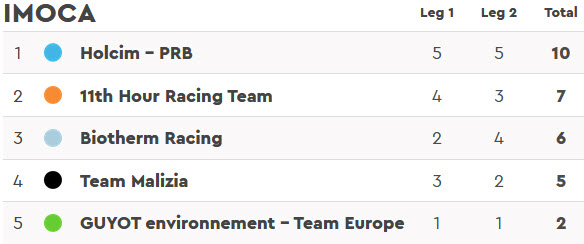

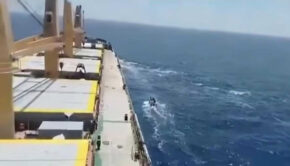
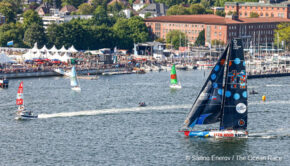
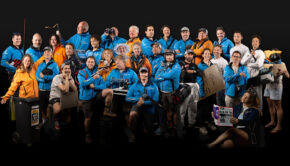
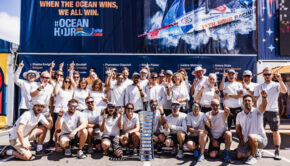
 We’ll keep your information safe.
We’ll keep your information safe.